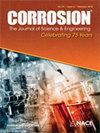Galvanic corrosion of strands in re-grouted, post-tensioned concrete bridges
IF 1.3
4区 材料科学
Q4 MATERIALS SCIENCE, MULTIDISCIPLINARY
引用次数: 0
Abstract
Grouted, post-tensioned (PTd) concrete systems are widely used to construct bridges, typically with an anticipated corrosion-free service life of 100+ years. However, the usage of inadequate grout materials and grouting practices in PTd concrete systems have caused unwanted air voids in ducts, leading to strand-grout-air (SGA) interface, carbonation of exposed grout layer and localized corrosion of strands (say, within about 10 to 20 years). Re-grouting of voids as a tendon repair strategy has led to accelerated galvanic corrosion of the portion of strands at the interface between the carbonated base grout and repair grout with different chemistry, raising concerns and reluctance in re-grouting of voids in tendons. This work focused on understanding and quantifying the galvanic corrosion at the interface of carbonated base grout and repair grout in a re-grouted tendon. The theoretical analysis based on mixed potential theory estimated a galvanic current density of ≈ 2 μA/cm2 and showed that the galvanic coupling can increase the corrosion current density of the prestressing steel in the base grout by about two-fold. The study on prestressed steel in simulated solutions estimated a galvanic current density of ≈ 20 μA/cm2. Then, the study on prestressing steel in grouts and the analytical simulation estimated galvanic current densities around 1.5 to 2 μA/cm2 at 95% external relative humidity and 25 °C. A model relating the galvanic current density in grouted systems as a function of external relative humidity was developed, which showed an exponential increase in the galvanic corrosion with an increase in external relative humidity. Also, a case study showed that if the tendon anchorage region experiences 95% external relative humidity for about 20 years, sufficient strand corrosion could happen, and structural behavior can change from ductile to brittle nature, which could be a serious concern for structures in the coastal zone.重新灌浆后张法混凝土桥梁中钢绞线的电化学腐蚀
灌浆后张法(PTd)混凝土系统被广泛用于建造桥梁,其预期无腐蚀使用寿命通常在 100 年以上。然而,在 PTd 混凝土系统中使用不适当的灌浆材料和灌浆方法会在导管中产生不必要的空隙,导致钢绞线-灌浆-空气(SGA)界面、裸露灌浆层碳化和钢绞线局部腐蚀(例如,在 10 到 20 年内)。重新灌注空隙作为一种肌腱修复策略,会导致碳化基底灌浆料和具有不同化学性质的修复灌浆料界面处的部分钢绞线加速电化学腐蚀,从而引发人们对肌腱空隙重新灌浆的担忧和不情愿。这项工作的重点是了解和量化重新灌浆的钢筋中碳化基灌浆料和修补灌浆料界面处的电化学腐蚀。基于混合电位理论的理论分析估计电化学电流密度为 ≈ 2 μA/cm2,结果表明电化学耦合可使基底灌浆料中预应力钢筋的腐蚀电流密度增加约两倍。对模拟溶液中预应力钢筋的研究估计,电化电流密度≈ 20 μA/cm2。然后,对灌浆料中预应力钢材的研究和分析模拟估计,在外部相对湿度为 95% 和温度为 25 °C 的条件下,电化电流密度约为 1.5 至 2 μA/cm2。建立了灌浆系统中的电化电流密度与外部相对湿度的函数关系模型,该模型显示,随着外部相对湿度的增加,电化腐蚀呈指数增长。此外,一项案例研究还表明,如果钢筋锚固区域的外部相对湿度达到 95%,持续约 20 年,钢绞线就会发生充分腐蚀,结构行为也会从韧性变为脆性,这可能是沿海地区结构的一个严重问题。
本文章由计算机程序翻译,如有差异,请以英文原文为准。
求助全文
约1分钟内获得全文
求助全文
来源期刊

Corrosion
MATERIALS SCIENCE, MULTIDISCIPLINARY-METALLURGY & METALLURGICAL ENGINEERING
CiteScore
2.80
自引率
12.50%
发文量
97
审稿时长
3 months
期刊介绍:
CORROSION is the premier research journal featuring peer-reviewed technical articles from the world’s top researchers and provides a permanent record of progress in the science and technology of corrosion prevention and control. The scope of the journal includes the latest developments in areas of corrosion metallurgy, mechanisms, predictors, cracking (sulfide stress, stress corrosion, hydrogen-induced), passivation, and CO2 corrosion.
70+ years and over 7,100 peer-reviewed articles with advances in corrosion science and engineering have been published in CORROSION. The journal publishes seven article types – original articles, invited critical reviews, technical notes, corrosion communications fast-tracked for rapid publication, special research topic issues, research letters of yearly annual conference student poster sessions, and scientific investigations of field corrosion processes. CORROSION, the Journal of Science and Engineering, serves as an important communication platform for academics, researchers, technical libraries, and universities.
Articles considered for CORROSION should have significant permanent value and should accomplish at least one of the following objectives:
• Contribute awareness of corrosion phenomena,
• Advance understanding of fundamental process, and/or
• Further the knowledge of techniques and practices used to reduce corrosion.
 求助内容:
求助内容: 应助结果提醒方式:
应助结果提醒方式:


